Fleas are a common concern for cat owners, and protecting our feline friends from these pesky parasites is a top priority.
One popular method of flea prevention is the use of flea collars. However, there is a misconception that flea collars can make cats lethargic.
In this article, we will address this myth and provide an accurate understanding of flea collars for cats, their effectiveness, and any potential effects on feline behavior.
Table of Contents
Understanding Flea Collars
Flea collars are designed to repel and kill fleas, ticks, and other pests that may infest cats. These collars contain active ingredients that are slowly released over time, providing continuous protection against fleas and ticks.
Flea collars work by emitting substances that are toxic to fleas, interrupting their life cycle and preventing infestations.
The Myth of Lethargy
One common concern among cat owners is that flea collars can make cats lethargic. However, it is important to note that there is no scientific evidence to support this claim.
Lethargy in cats can have various causes, including illness, stress, or environmental factors unrelated to the use of flea collars. It is essential to evaluate any changes in your cat’s behavior holistically, considering other potential factors that may contribute to lethargy.
Factors Affecting Cat Behavior
To better understand the potential effects of flea collars on cat behavior, it is important to consider other factors that can influence feline behavior and energy levels:
- Environmental Factors: Cats are sensitive to their surroundings, and changes in the environment can affect their behavior. Factors such as temperature, humidity, lighting, and changes in routine or living arrangements can impact a cat’s energy levels and overall behavior.
- Stress and Anxiety: Cats are prone to stress and anxiety, which can manifest in various ways, including lethargy. Factors such as changes in the household, introduction of new pets, or unfamiliar visitors can contribute to feline stress levels. It is essential to consider these potential stressors when assessing a cat’s behavior.
- Health Conditions: Lethargy can be a symptom of an underlying health issue in cats. It is important to monitor your cat’s overall health and consult with a veterinarian if you notice any changes in behavior, including prolonged or unexplained lethargy. A thorough examination by a veterinarian can help determine the cause of lethargy and guide appropriate treatment.
- Individual Cat Differences: Just like humans, cats have unique personalities and energy levels. Some cats are naturally more active and playful, while others are more laid-back and relaxed. These individual differences can influence how a cat responds to flea collars or any changes in their environment.
Ensuring Proper Use of Flea Collars
While there is no evidence to suggest that flea collars directly cause lethargy in cats, it is important to follow proper usage guidelines to ensure the well-being of your pet:
- Choose the Right Collar: Select a flea collar specifically designed for cats. Avoid using flea collars designed for other animals, as they may contain ingredients that could be harmful to cats.
- Proper Fit: Ensure that the flea collar fits properly around your cat’s neck. It should be snug enough to prevent the cat from getting caught on objects but not so tight that it causes discomfort or restricts movement.
- Monitor for Allergic Reactions: Some cats may be sensitive or allergic to certain ingredients in flea collars. Monitor your cat for any signs of allergic reactions, such as excessive itching, redness, swelling, or hair loss. If you notice any of these symptoms, remove the collar immediately and consult a veterinarian.
- Follow Manufacturer Instructions: Carefully read and follow the manufacturer’s instructions regarding the application and duration of use for the flea collar. Overuse or incorrect application can potentially lead to adverse effects.
The belief that flea collars make cats lethargic is a common misconception. While cats may exhibit changes in behavior for various reasons, there is no scientific evidence to suggest that flea collars directly cause lethargy.
It is crucial to consider other factors, such as environmental changes, stress, health conditions, and individual cat differences, when assessing changes in a cat’s behavior.
If you have concerns about your cat’s behavior or suspect underlying health issues, it is always recommended to consult with a veterinarian for proper evaluation and guidance.
Flea collars, when used according to manufacturer instructions, can be an effective tool in protecting cats from fleas and ticks, providing peace of mind for pet owners.


